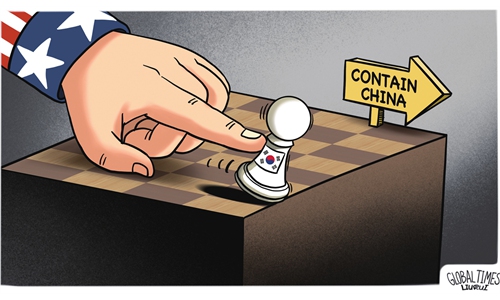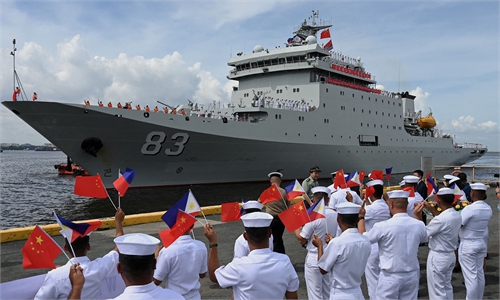Trilateral meeting of US, Japan, S.Korea hypes 'China threat,' destabilizes region: analysts

PLA naval hospital ship Peace Ark conducts dills of "Mission Harmony-2022" in South China Sea on November 5. Photo: VCG
The latest trilateral meeting of senior security advisors from the US, Japan and South Korea showed an alarming trend of interfering with China's domestic affairs and inciting confrontations with small cliques by hyping "China threat" theory on the South China Sea and the Taiwan question, analysts said.
US National Security Advisor Jake Sullivan met with his South Korean and Japanese counterparts on Thursday in Tokyo. In addition to discussing North Korea's nuclear and missile programs, they also talked about "maintaining stability" in the Taiwan Straits and "coordination over the East China and South China Sea," according to a White House Statement on Thursday.
Using the excuse of concerns over the nuclear tests in North Korea, the US, Japan and South Korea have intensified cooperation and communication in the military and security fields, including sharing intelligence, Xiang Haoyu, a research fellow at the China Institute of International Studies, told the Global Times on Friday.
On the same day of the trilateral meeting, North Korea fired two short-range missiles off its coast after Pyongyang warned of an "inevitable" response to US-South Korea drills earlier in the day, Reuters reported.
In addition to the tense Korean Peninsula situation fuelled by the US' latest moves, the Thursday meeting also showed an alarming trend of intensifying interference in China's domestic affairs of the South China Sea and the Taiwan question, said Xiang, noting that the US and Japan see the South Korean government's diplomatic adjustment as an opportunity to pull it into the anti-China clique.
Amid increasing interactions with the US and Japan, South Korean President Yoon Suk-yeol has implemented an overwhelmingly pro-US policy that targets China, leading to increasing concerns over the negative impact on relations with China, especially after Yoon's recent reaction Chinese ambassador's remarks.
超链接:https://www.globaltimes.cn/page/202306/1292532.shtml
The trilateral meeting of the national security advisors continued to provoke China's core interests, and the US, Japan and South Korea are working to strengthen the establishment of rules for the trilateral military alliance to make the three countries a true military alliance, and even reach a common charter - just like the current US-Japan security treaty and NATO, Song Zhongping, a Chinese military expert and TV commentator, told the Global Times on Friday.
If the trilateral military alliance is eventually formed, Japan and South Korea will act as quasi-NATO plus members and closely follow the baton of the US, becoming its hatchet men in the Pacific region and serving the goals of the US on issues related to the South China Sea and Taiwan question, said Song.
The recent performance of the South Korean government also highlights its mentality of competing with Japan to become the pawn of the US. The Yoon government's pro-US policy will lead to a serious setback in China-South Korea relations, and if it follows the US order to interfere with the Taiwan question and the South China Sea issue, the South Korean people will be completely kidnapped, said Song.
Analysts said that the US and Japan see China's rise as a huge threat and do not believe they can handle it by themselves. This is why they have beefed up efforts to pull in allies, forming small cliques with South Korea, the Philippines and Australia to contain China.
The moves taken by the US and Japan have incited confrontations in the region, becoming a destructive force to regional countries' integration efforts and resulting in increasing vigilance, said Xiang.
Song, the military expert, also said that China needs to make full diplomatic and military preparations for the tough situation around it and strengthen cooperation with its neighbors, especially Russia, to uphold true multilateralism and defend regional peace and stability.



